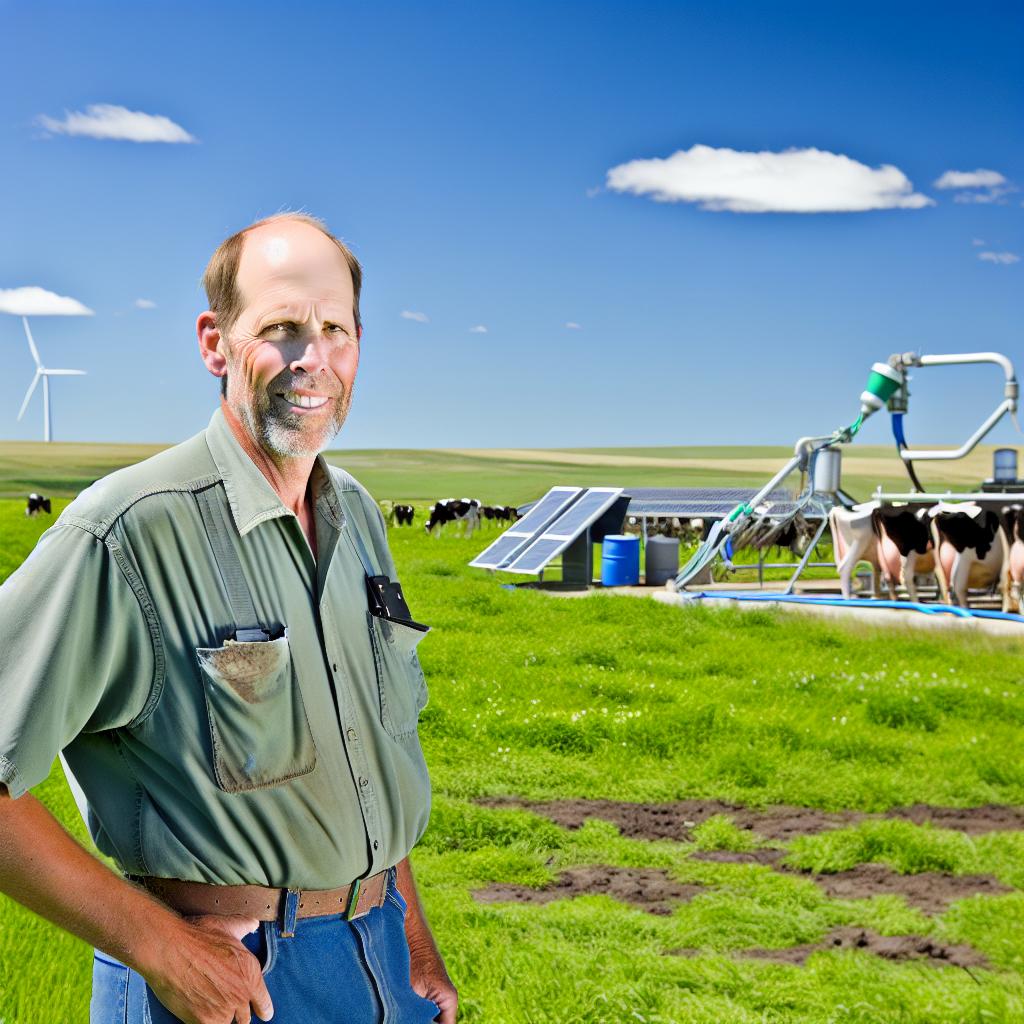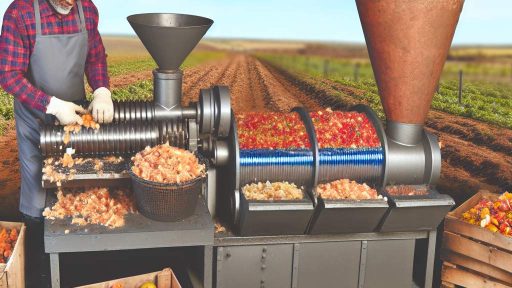Introduction to Organic Dairy Farming and Its Importance
Organic dairy farming represents a key approach to sustainable agriculture.
This practice prioritizes animal welfare, environmental health, and consumer safety.
In recent years, awareness of its benefits has significantly increased.
Pursuing organic methods contributes to a healthier food system.
Farmers adopting organic practices utilize natural inputs and methods.
This reduces reliance on synthetic fertilizers and pesticides.
Consequently, organic dairy farming fosters biodiversity across ecosystems.
Benefits for Animal Welfare
Organic dairy farms prioritize the well-being of their cows.
These farms provide animals with access to pasture and outdoor spaces.
In addition, they ensure cows receive organic feed, free from GMOs.
This approach leads to lower stress levels and improved health.
As a result, healthy cows produce high-quality milk.
Environmental Benefits
Organic dairy farming plays an essential role in protecting the environment.
This practice enhances soil quality through natural farming techniques.
Cover crops and crop rotation improve soil structure and fertility.
Transform Your Agribusiness
Unlock your farm's potential with expert advice tailored to your needs. Get actionable steps that drive real results.
Get StartedAdditionally, organic farms promote water conservation practices.
Minimizing chemical runoff helps protect local water sources.
Consumer Demand and Market Growth
There is a growing consumer demand for organic dairy products.
Health-conscious customers seek assurance in product quality.
Organic labeling provides transparency regarding farming practices.
This trend supports market growth for organic dairy products.
Farmers who transition to organic methods can access premium prices.
Long-term Sustainability Goals
Organic dairy farming aligns with broader sustainability goals.
This approach addresses climate change through reduced carbon footprints.
Moreover, it supports regenerative agriculture practices.
Through these methods, farmers contribute to global food security.
Thus, organic dairy farming is vital for future generations.
Key Principles of Organic Dairy Farming
Soil Health
Healthy soil is the foundation of organic dairy farming.
It promotes nutrient cycling and supports robust plant growth.
Farmers enhance soil health through composting and cover cropping.
Additionally, rotating crops helps maintain soil fertility.
Soil tests can determine nutrient needs and pH levels.
Applying organic fertilizers supports sustainable soil management.
Animal Welfare
Animal welfare is a central concern in organic dairy farming.
Farmers prioritize natural behaviors and provide ample space for cows.
Access to pasture is essential, allowing cows to graze freely.
Organic standards require the use of organic feed for livestock.
Healthcare practices emphasize preventative measures without antibiotics.
Practices Supporting Sustainability
Implementing Rotational Grazing
Rotational grazing offers various ecological benefits.
Showcase Your Farming Business
Publish your professional farming services profile on our blog for a one-time fee of $200 and reach a dedicated audience of farmers and agribusiness owners.
Publish Your ProfileThis method improves soil quality while reducing erosion.
Additionally, it enhances pasture productivity over time.
Utilizing Native Breeds
Native breeds adapt better to local climates and conditions.
They often require less intervention and are more resilient.
Furthermore, these breeds contribute to biodiversity on farms.
Environmental Impact
Minimizing Chemical Use
Organic dairy farming limits the use of synthetic chemicals.
This practice benefits surrounding ecosystems and wildlife.
Farmers can use natural pest-control methods to protect crops.
Water Conservation
Effective water management is crucial in organic dairy farming.
Practices include using rainwater harvesting systems.
This approach conserves resources and reduces costs for farmers.
Organic Feed Sources
Nutritional Needs
Cows require a balanced diet to produce high-quality milk.
They need proteins, fats, carbohydrates, vitamins, and minerals.
Organic feed contributes significantly to meeting these nutritional needs.
Furthermore, it helps maintain overall herd health.
Sustainable Practices in Organic Dairy Farming
Utilizing local feed sources is a sustainable practice.
This approach reduces transportation costs and emissions.
Farmers can grow their feed through crop rotation techniques.
Additionally, integrating legumes can enhance soil nitrogen levels.
Forage-based diets support rumen health in dairy cows.
Examples of Organic Feed Sources
- Alfalfa hay provides high protein content.
- Clover is excellent for enriching soil and feeding cows.
- Oats and barley are beneficial grains for energy.
- Molasses can improve palatability and energy intake.
Benefits of Organic Feed
Organic feed enhances milk quality with better flavor profiles.
Furthermore, it reflects positively on animal welfare.
Using organic feed ensures that the cows are free from synthetic additives.
This practice aligns with consumers’ increasing demand for clean food.
Learn More: Permaculture Practices for Efficient Water Conservation Methods
Pasture-Based Systems: Benefits for Cows and the Environment
Enhanced Animal Welfare
Cows thrive in pasture-based systems.
They enjoy natural grazing behavior.
This leads to lower stress levels compared to confinement settings.
This leads to improved overall health and productivity.
Nutritional Advantages
Pasture-fed cows consume a varied diet rich in nutrients.
This diet includes fresh grasses and legumes, enhancing milk quality.
In addition, it increases omega-3 fatty acids in milk.
Environmental Benefits
Pasture-based systems contribute positively to soil health.
They reduce soil erosion through enhanced root systems.
Furthermore, these systems can sequester carbon, lessening greenhouse gas emissions.
Economic Viability
Pasture-based dairy farming can lead to lower feed costs.
This approach utilizes natural resources effectively and sustainably.
Moreover, consumers increasingly prefer products from organic farms.
Supporting Local Biodiversity
Pasture systems promote diverse plant and animal life.
They create habitats for various species, enhancing ecosystems.
Showcase Your Farming Business
Publish your professional farming services profile on our blog for a one-time fee of $200 and reach a dedicated audience of farmers and agribusiness owners.
Publish Your ProfileThis diversity is essential for resilient agricultural practices.
Discover More: Community-Supported Agriculture: Nurturing Biodiversity On American Farms
Water Management in Organic Dairy Farming: Best Practices
Importance of Water Management
Water management is crucial for organic dairy farming.
It ensures the health of livestock and milk production.
Proper water practices can enhance sustainability in farming.
Water Source Identification
Identifying reliable water sources is essential.
These sources may include wells, ponds, or streams.
Farmers should assess the quality of water regularly.
Water Conservation Strategies
Implementing water conservation strategies benefits farms.
These strategies help reduce waste and promote sustainability.
- Install rainwater harvesting systems.
- Use drip irrigation for feeding crops.
- Maintain soil health to enhance moisture retention.
Efficient Water Usage
Efficient water usage promotes better management.
Farmers can monitor water application regularly.
Using technology can significantly improve efficiency.
Regular Maintenance of Water Systems
Regular maintenance of water systems is necessary.
Inspect pumps, pipes, and storage facilities frequently.
Keep all equipment clean to ensure good water quality.
Training and Awareness
Training staff on water management practices is vital.
Awareness programs enhance knowledge on water conservation.
Involve the community in water sustainability initiatives.
Gain More Insights: Farm-to-Restaurant Programs for Direct Produce Sales

Pest and Disease Management in Organic Dairy: Natural Solutions
Understanding Pest and Disease Challenges
Pest and disease management is crucial in organic dairy farming.
Farmers face various challenges that can affect milk production.
Common pests include flies, ants, and ticks.
Diseases such as mastitis and foot rot can harm livestock health.
Maintaining animal health directly impacts milk quality and quantity.
Natural Pest Control Methods
Employing natural methods can effectively manage pests without chemicals.
One popular approach is the use of beneficial insects.
Ladybugs can help control aphid populations.
Additionally, nematodes target soil-dwelling pests effectively.
Using insectary plants can attract these beneficial insects.
Maintaining a Healthy Environment
Creating a healthy ecosystem prevents pest and disease outbreaks.
Crop rotation helps disrupt pest life cycles.
Mixed grazing practices can reduce the risk of disease transmission.
Maintaining clean facilities also helps minimize disease spread.
Monitoring and Early Detection
Regular monitoring allows farmers to detect problems early.
Inspecting animals daily for signs of illness is crucial.
Keeping records of health issues helps identify trends and solutions.
Furthermore, investing in early detection tools can be beneficial.
Utilizing Organic Treatments
Organic treatments are available for managing common diseases.
Essential oils can provide natural antimicrobial properties.
Showcase Your Farming Business
Publish your professional farming services profile on our blog for a one-time fee of $200 and reach a dedicated audience of farmers and agribusiness owners.
Publish Your ProfileHerbal remedies, such as garlic and oregano oil, can strengthen immunity.
Additionally, probiotics support gut health in livestock.
Education and Community Support
Staying informed about best practices is essential for success.
Farmers can benefit from workshops and online courses.
Joining cooperative groups fosters knowledge sharing and support.
Networking with local experts enhances problem-solving capabilities.
Learn More: Biodiversity in Farming for Supporting Beneficial Insects
The Role of Organic Certifications in Dairy Farming Sustainability
Importance of Organic Certifications
Organic certifications play a vital role in dairy farming sustainability.
They help ensure that farming practices meet strict ecological standards.
These certifications promote environmentally friendly methods in milk production.
Ultimately, they encourage farmers to adopt responsible practices.
Benefits of Organic Certifications
Organic certifications provide several key benefits for dairy farmers.
- They enhance consumer trust in dairy products.
- Farmers gain access to premium pricing for their organic milk.
- These certifications promote biodiversity and ecological health.
Therefore, they motivate farmers to improve their agricultural techniques.
The Certification Process
The certification process involves several steps and requirements.
First, farmers must implement organic practices for a set period.
This period is usually three years before certification can be granted.
Next, farmers undergo thorough inspections by certifying agencies.
These inspections ensure compliance with organic standards.
Finally, successful farms receive certification that they can display.
Challenges of Maintaining Organic Certification
While beneficial, maintaining organic certification comes with challenges.
Farmers must consistently adhere to organic practices.
Incorrect use of prohibited substances can jeopardize certification.
Additionally, farmers face financial and labor-related challenges.
Therefore, continuous education and support are crucial for success.
Future of Organic Certifications in Dairy Farming
The future of organic certifications looks promising in the dairy sector.
Consumer demand for organic products continues to rise.
This trend encourages more farmers to pursue organic certifications.
Moreover, advancements in agricultural practices can enhance sustainability.
As a result, the dairy industry is likely to evolve positively.
Marketing and Consumer Trends in Organic Dairy Products
Understanding Market Growth
The organic dairy market is expanding rapidly.
Consumer awareness drives the demand for organic products.
People are increasingly concerned about food quality.
This trend creates opportunities for organic dairy farmers.
Shifts in Consumer Preferences
More consumers prefer products that are environmentally friendly.
Health and wellness are top priorities for many shoppers.
Organic dairy products align with these values.
Consumers now seek transparency in sourcing and production.
Target Demographics
Young families are a significant market for organic dairy.
They prioritize health for their children.
Millennials also contribute to this trend.
Showcase Your Farming Business
Publish your professional farming services profile on our blog for a one-time fee of $200 and reach a dedicated audience of farmers and agribusiness owners.
Publish Your ProfileThey are more inclined to pay a premium for organic options.
Effective Marketing Strategies
Utilizing social media is crucial for reaching modern consumers.
Farmers can showcase their practices online.
Community engagement fosters brand loyalty.
Offering samples at local events promotes product awareness.
Branding and Labeling Importance
Clear labeling helps consumers make informed choices.
Brands must communicate their organic certifications effectively.
Trust is essential for customer retention.
Challenges in Marketing
Higher production costs can limit market competitiveness.
Education on the benefits of organic dairy is necessary.
Consumers may still associate price with quality.
Overcoming these perceptions requires strategic outreach.
Future Trends to Watch
Technological advancements may shape the organic dairy market.
Adopting innovative farming practices can enhance efficiency.
Future marketing efforts will likely emphasize sustainability.
Additional Resources
Farm to Fork Strategy – European Commission
Farm to Table: Building Local and Regional Food Systems – SARE




